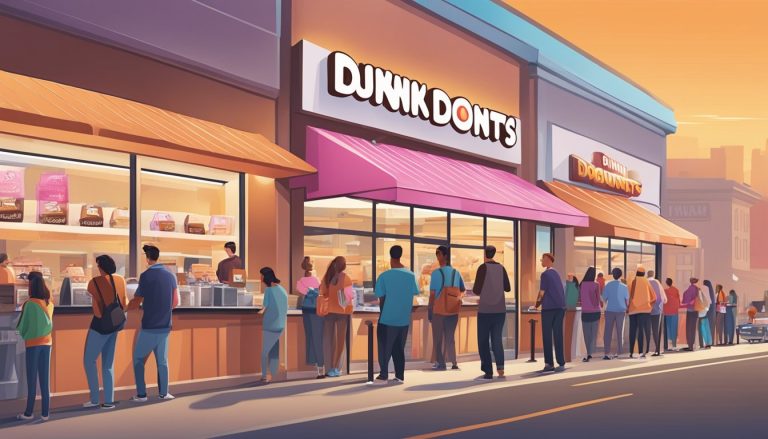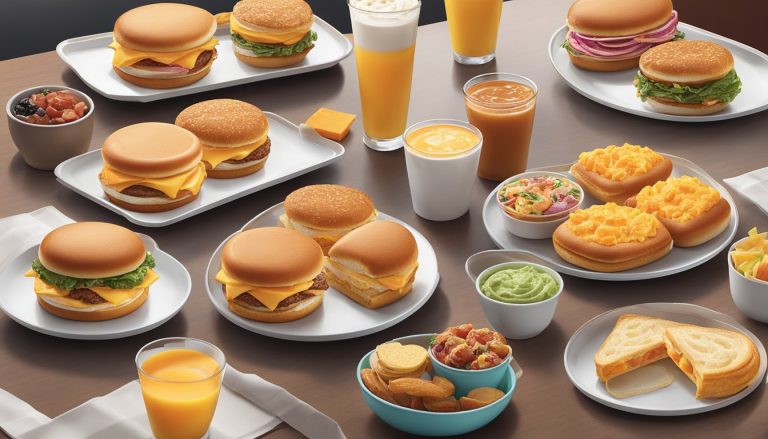Dunkin’, formerly known as Dunkin’ Donuts, has come a long way since its humble beginnings in Quincy, Massachusetts. The company’s menu has undergone a remarkable transformation, expanding from its original focus on doughnuts and coffee to encompass a wide array of breakfast items, sandwiches, and beverages. This evolution reflects Dunkin’s ability to adapt to changing consumer preferences and stay competitive in the fast-paced food industry.
As Dunkin’ grew from a local coffee shop into a global franchise, its menu expanded to cater to diverse tastes and dietary needs. The introduction of Munchkins donut hole treats in 1972 marked an early step in this direction. Subsequent additions included bagels in 1996, followed by Coolatta frozen beverages and breakfast sandwiches. These new offerings helped Dunkin’ transform from a doughnut-centric brand into a more comprehensive breakfast and coffee destination.
In recent years, Dunkin’ has continued to innovate, introducing healthier options and embracing modern trends. The company’s rebranding efforts, including dropping “Donuts” from its name in 2019, symbolize its commitment to evolving beyond its original doughnut shop identity. This strategic shift has allowed Dunkin’ to compete more effectively in the broader quick-service restaurant market while maintaining its core strengths in coffee and baked goods.
The Rise of a Doughnut Giant

Dunkin’ Donuts’ journey from a single shop to a global brand is a testament to innovation and quality. The company’s growth was fueled by a visionary founder, iconic products, and an unwavering commitment to customer satisfaction.
The Open Kettle to Dunkin’ Donuts
In 1946, Bill Rosenberg opened a restaurant called “The Open Kettle” in Quincy, Massachusetts. The establishment quickly gained popularity for its coffee and donuts. Recognizing the potential, Rosenberg renamed it “Dunkin’ Donuts” in 1950.
The new name reflected the company’s focus on donuts and the practice of dunking them in coffee. This simple concept resonated with customers, leading to rapid expansion. By 1955, Rosenberg had opened five Dunkin’ Donuts shops.
Bill Rosenberg’s Vision
Bill Rosenberg’s entrepreneurial spirit and business acumen were crucial to Dunkin’ Donuts’ success. He introduced the franchise model in 1955, allowing the brand to grow exponentially.
Rosenberg emphasized consistency and quality across all locations. He implemented standardized recipes and processes to ensure customers had the same experience at every shop. This commitment to uniformity helped build trust and loyalty among patrons.
His vision extended beyond just selling donuts. Rosenberg saw Dunkin’ Donuts as a place where people could enjoy affordable, quality food and beverages in a friendly atmosphere.
Classic Donuts and Munchkins®
Dunkin’ Donuts’ menu initially focused on coffee and classic donuts. Popular varieties included glazed, chocolate frosted, and jelly-filled donuts. These staples became synonymous with the brand.
In 1972, Dunkin’ introduced Munchkins®, bite-sized donut holes that quickly became a fan favorite. These snackable treats appealed to both children and adults, further expanding the company’s customer base.
The commitment to quality remained evident in the donut-making process. Shops made donuts fresh throughout the day, ensuring customers always received a delicious product. This dedication to freshness set Dunkin’ apart from competitors and solidified its position as a leading donut chain.
Expanding Beyond Doughnuts

Dunkin’ has transformed its menu over the years, moving beyond its doughnut roots to offer a diverse range of breakfast items and beverages. This expansion has allowed the chain to cater to changing consumer preferences and compete in new market segments.
Introducing Breakfast Sandwiches
Dunkin’ ventured into the breakfast sandwich market to meet growing demand for portable morning meals. The chain launched a variety of options, including:
- Egg and cheese on English muffins
- Bacon, egg, and cheese on croissants
- Turkey sausage flatbreads
These sandwiches quickly gained popularity among customers seeking heartier breakfast choices. Dunkin’ also embraced plant-based trends, introducing the Beyond Sausage Sandwich in 2019. This innovative offering features a plant-based patty, catering to vegetarian and health-conscious consumers.
Diversifying with Bagels and Muffins
To further expand its breakfast offerings, Dunkin’ added bagels and muffins to its menu. The chain now offers:
- Plain, sesame, and everything bagels
- Blueberry, chocolate chip, and corn muffins
These items provide customers with more variety and appeal to those seeking alternatives to doughnuts. Dunkin’ also introduced cream cheese spreads and butter to complement its bagel selection, enhancing the customization options for patrons.
Entry into Beverages Market
Dunkin’ made a significant push into the beverages market, recognizing the growing importance of coffee and other drinks. The chain developed an extensive coffee menu, featuring:
- Hot and iced coffee
- Lattes and cappuccinos
- Cold brew
Dunkin’ also expanded into tea offerings, including hot and iced varieties. The introduction of flavored syrups and dairy alternatives allowed for further customization. Seasonal beverages, such as pumpkin spice lattes, have become popular limited-time offerings that drive customer excitement and repeat visits.
A Beverage-Led Brand

Dunkin’ has strategically shifted its focus to become a beverage-centric company. This transition emphasizes coffee, frozen drinks, and innovative beverage offerings while still maintaining its iconic doughnut heritage.
The Significance of Coffee in Dunkin’s Menu
Coffee forms the cornerstone of Dunkin’s beverage strategy. The brand has invested heavily in improving its coffee quality and expanding its coffee menu. Dunkin’ offers a wide range of coffee options, from classic hot brews to iced variations.
Espresso-based drinks like lattes and macchiatos have become increasingly popular. The company has also introduced specialty blends and seasonal flavors to cater to diverse tastes.
Dunkin’s commitment to coffee excellence is evident in its bean selection process and brewing techniques. This focus on quality has helped position Dunkin’ as a serious competitor in the coffee market.
Innovations in Coffee and Teas
Dunkin’ regularly introduces new coffee and tea products to keep its menu fresh and exciting. The brand has embraced trends like cold brew coffee, which offers a smoother, less acidic taste profile.
Iced teas have also gained prominence on Dunkin’s menu. Flavored varieties and sweetened options provide customers with refreshing alternatives to coffee.
Seasonal offerings, such as the popular pumpkin spice latte, generate buzz and drive foot traffic. These limited-time beverages create a sense of urgency and encourage repeat visits.
Frozen Drinks and Other Beverages
Coolatta frozen beverages have become a signature item for Dunkin’. These blended drinks come in various flavors, appealing to customers seeking a cold, indulgent treat.
Hot chocolate remains a staple on Dunkin’s menu, especially during colder months. The brand has expanded its hot chocolate offerings to include flavored versions and premium ingredients.
Dunkin’ has also ventured into energy drinks and smoothies to cater to health-conscious consumers. These additions demonstrate the brand’s commitment to evolving with changing consumer preferences.
Driving Consumer Engagement

Dunkin’ has implemented innovative strategies to attract and retain customers. The company focuses on technology, rewards programs, and targeted marketing campaigns to enhance brand loyalty and drive sales growth.
Enhancing Customer Experience through Technology
Dunkin’ leverages technology to streamline ordering and improve customer satisfaction. The brand’s mobile app allows customers to place orders for pickup or delivery, reducing wait times and enhancing convenience. In-store digital menu boards provide dynamic, easy-to-read displays of menu items and promotions.
Contactless payment options have been integrated into Dunkin’s systems, catering to evolving consumer preferences for touchless transactions. The company has also invested in AI-powered chatbots for customer service, providing quick responses to inquiries and improving overall support.
Loyalty and Rewards Programs
DD Perks, Dunkin’s loyalty program, offers members points for purchases redeemable for free beverages. The program provides personalized offers based on customer preferences and purchase history.
Members receive exclusive perks like birthday rewards and early access to new menu items. DD Perks integrates seamlessly with the mobile app, allowing easy point tracking and reward redemption.
The program’s tiered structure incentivizes frequent visits, with higher tiers offering additional benefits like faster point accrual and special discounts.
Marketing Campaigns and Partnerships
Dunkin’ runs seasonal promotions tied to holidays and events, creating limited-time offerings to drive excitement and urgency. The brand collaborates with popular personalities and influencers to reach younger demographics.
Partnerships with sports teams and entertainment properties expand Dunkin’s visibility. Co-branded products and cross-promotions with complementary brands create unique offerings and attract new customers.
Social media campaigns encourage user-generated content, fostering community engagement. Dunkin’ utilizes data-driven marketing to target specific customer segments with tailored messaging and offers.
Commitment to Sustainability and Quality

Dunkin’ has made significant strides in implementing sustainable practices and maintaining high-quality standards across its menu offerings. The company’s efforts span from sourcing ingredients to reducing environmental impact.
Sustainable Practices
Dunkin’ has set ambitious goals to improve its environmental footprint. By 2025, the company aims to convert 100% of eggs for its U.S. menu to cage-free sources. This commitment extends to international markets, with plans to source cage-free eggs for sandwiches in Latin America and Caribbean restaurants.
Dunkin’ has also focused on sustainable packaging and building operations. The company uses zero-VOC paints in its restaurants and implements indoor air quality management systems.
Energy efficiency is another priority. Dunkin’ works to reduce its environmental impact through energy-efficient practices in its locations.
Upholding Quality and Taste
Dunkin’ has taken steps to enhance the quality of its menu items while preserving their signature taste. The company has successfully removed artificial dyes from donuts, baked goods, breakfast sandwiches, and coffee flavorings.
This move towards cleaner ingredients extends to nearly all frozen beverages as well. Dunkin’ balances these changes with maintaining the flavors customers expect.
The brand’s commitment to quality is evident in its diverse menu. From classic glazed donuts to trendy plant-based breakfast sandwiches, Dunkin’ aims to cater to evolving consumer preferences.
Dunkin’ also provides sustainable building operations training for crew members, ensuring quality standards are maintained at every level of service.
Adapting to the Modern World

Dunkin’ has embraced technological advancements and expanded its global presence to stay competitive in the fast-paced food industry. These strategic moves have transformed how customers interact with the brand and access its products.
The Impact of Mobile Ordering
Dunkin’ launched its mobile ordering app in 2016, revolutionizing customer convenience. The app allows users to place orders in advance, skip lines, and earn rewards points. This technology has significantly reduced wait times and improved order accuracy.
Drive-thru locations have integrated mobile ordering, enabling customers to pick up their orders without leaving their vehicles. The app also provides personalized offers and menu recommendations based on previous purchases.
On-the-go ordering has become increasingly popular, with millions of users embracing this convenient option. Dunkin’ has continually updated its app to enhance user experience and streamline the ordering process.
Franchising and Global Expansion
Dunkin’ has leveraged franchising to fuel its rapid growth both domestically and internationally. This model has allowed the brand to expand quickly while maintaining consistent quality across locations.
The company has adapted its menu and store designs to suit local tastes and preferences in different countries. For example, in India, Dunkin’ offers vegetarian options and spicy flavors to cater to local palates.
Franchisees receive comprehensive training and support to ensure they uphold Dunkin’s standards. This approach has enabled the brand to maintain its identity while adapting to diverse markets.
Dunkin’ has successfully established a presence in over 40 countries, with plans for further expansion. The brand’s global strategy focuses on identifying key markets and partnering with local operators who understand regional dynamics.
The Future of Dunkin’s Menu

Dunkin’ continues to innovate its menu offerings, focusing on both food and beverage options that cater to changing consumer preferences. The brand is expanding beyond its traditional doughnut roots to embrace a wider range of breakfast and all-day items.
Innovative Food Items
Dunkin’ is introducing more health-conscious and plant-based options to appeal to a broader customer base. The Beyond Sausage Sandwich, made with plant-based protein, has been a successful addition. Wake-up Wraps provide a lighter alternative to full-sized sandwiches. Stuffed Bagel Minis offer a unique twist on classic bagels.
Snackin’ Bacon caters to low-carb dieters and bacon enthusiasts. Hash browns remain a popular side, complementing both sweet and savory menu items. Dunkin’ is also expanding its bakery selection beyond doughnuts, with items like muffins and croissants gaining prominence.
Expanding Drink Selections
Dunkin’ is putting significant effort into diversifying its beverage lineup. Cold brew coffee has become a menu staple, with flavored variants gaining popularity. The chain is experimenting with new espresso-based drinks, such as lattes and macchiatos, to compete with specialty coffee shops.
Frozen beverages like Coolatas continue to evolve with seasonal flavors. Tea options are expanding, including both hot and iced varieties. Dunkin’ is also exploring functional beverages, incorporating ingredients with perceived health benefits. Energy drinks and smoothies may become future menu additions as Dunkin’ aims to capture a larger share of the beverage market.




